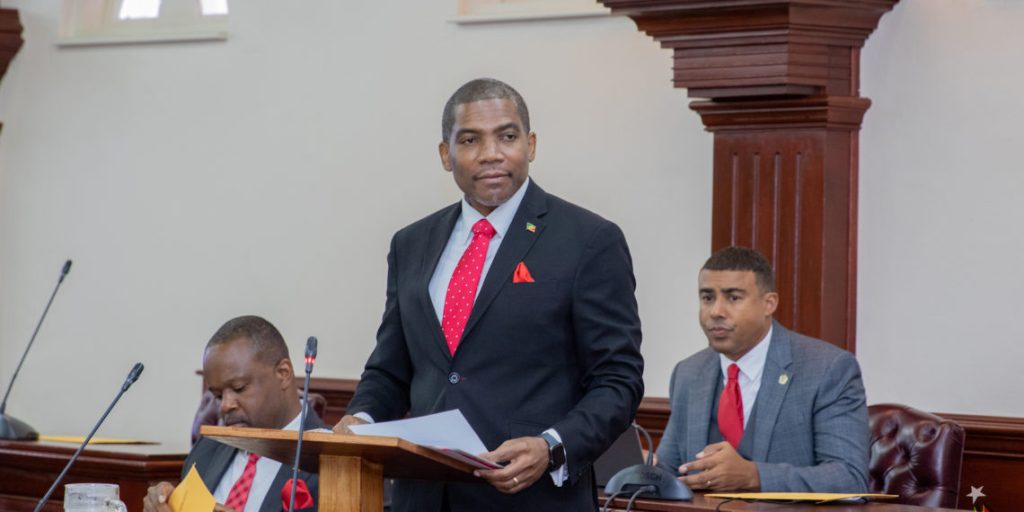Prime Minister Drew’s Landmark Pension Bill: Rectifying a Century of Imbalance
The historic Pensions (Amendment) Bill 2025, presented to the National Assembly of St. Kitts and Nevis by Prime Minister Hon. Dr. Terrance Drew, marks a transformative moment for Government Auxiliary Employees (GAEs). This legislation replaces an outdated 1947 pension model with a contributory system, guaranteeing pensions for GAEs after 15 years of service, a benefit previously denied to this vital segment of the civil service. Prime Minister Drew emphasized the significance of this change, highlighting the equity it brings to these workers who have long formed the backbone of the government yet lacked the security of a guaranteed pension. The new law aims to ensure that GAEs, like other civil servants, can retire with dignity and financial stability. The current system often leaves retirees reliant solely on Social Security, providing only a fraction of their working income. The new combined pension and Social Security benefits will ensure retirees receive up to 100% of their pre-retirement income, significantly improving their quality of life post-retirement. The timing of the bill’s introduction, just before Labour Day 2025, underscores its importance and alignment with the government’s commitment to worker empowerment.
The new pension scheme is designed to be inclusive, benefiting all GAEs regardless of political affiliation. Prime Minister Drew stressed that the bill transcends partisan politics and focuses solely on the well-being of the workers. This inclusive approach reflects a commitment to fairness and recognizes the contributions of all GAEs to the functioning of the government. The establishment of a dedicated pension fund will ensure the long-term sustainability of the program, safeguarding the benefits for current and future generations of GAEs. Additionally, the bill addresses the concerns of workers who leave government service before reaching the 15-year threshold for pension eligibility. These individuals will receive a full refund of their contributions, plus accrued interest, ensuring that their investment in the system is protected even if they don’t qualify for a full pension. This provision adds another layer of security and fairness to the new pension framework.
With over 2,000 GAEs, representing approximately 10% of the nation’s workforce, set to benefit, the impact of this reform will be substantial. Prime Minister Drew highlighted the magnitude of this change, emphasizing that it will lift a significant portion of the working population out of potential poverty during retirement. The reform aligns with the government’s Sustainable Island State Agenda, which prioritizes empowering citizens and ensuring their well-being. The Prime Minister contrasted this empowerment with mere pity, emphasizing that the pension reform recognizes the hard work and dedication of GAEs and provides them with the deserved reward for their service. The bill signifies not just financial security but also respect and recognition for their contributions.
The Prime Minister grounded the Pensions Amendment Bill 2025 within the historical context of the St. Kitts-Nevis Labour Movement. He traced the movement’s legacy of advocating for workers’ rights, starting from its inception in 1932. He highlighted its role in securing fundamental advancements for the people, including democracy, Social Security, universal education, and land ownership. The bill, therefore, represents a continuation of this legacy, demonstrating the ongoing commitment of the Labour Movement to improving the lives of workers and building a more equitable society. It symbolizes another milestone in the movement’s long struggle for social and economic justice.
The Pensions Amendment Bill 2025 represents a landmark achievement in the history of St. Kitts and Nevis, particularly concerning labor rights and social welfare. It addresses a longstanding inequity by providing GAEs with the same pension security afforded to other civil servants. The bill’s emphasis on inclusivity, sustainability, and the return of contributions with interest demonstrates a commitment to fairness and responsible governance. By ensuring a dignified retirement for a significant portion of the workforce, the bill contributes to the overall well-being and economic stability of the nation. This legislation has far-reaching implications, not only for the individuals directly impacted but also for the broader society, fostering a sense of security and promoting social cohesion.
The Prime Minister’s impassioned presentation underscored the personal significance of this legislation for him and his administration. He positioned the bill as a fulfillment of the government’s promise to prioritize the needs of the people, particularly those who have long been overlooked. He emphasized that the bill was not a handout but a recognition of the hard work and dedication of GAEs, a group essential to the smooth functioning of the government. The Prime Minister’s direct engagement with the GAEs present at the National Assembly, acknowledging their presence and highlighting their importance, further reinforced the message that this legislation is about valuing and respecting the contributions of every worker. The bill, therefore, stands as a testament to the government’s commitment to building a more just and equitable society in St. Kitts and Nevis.
Share this content:












Post Comment